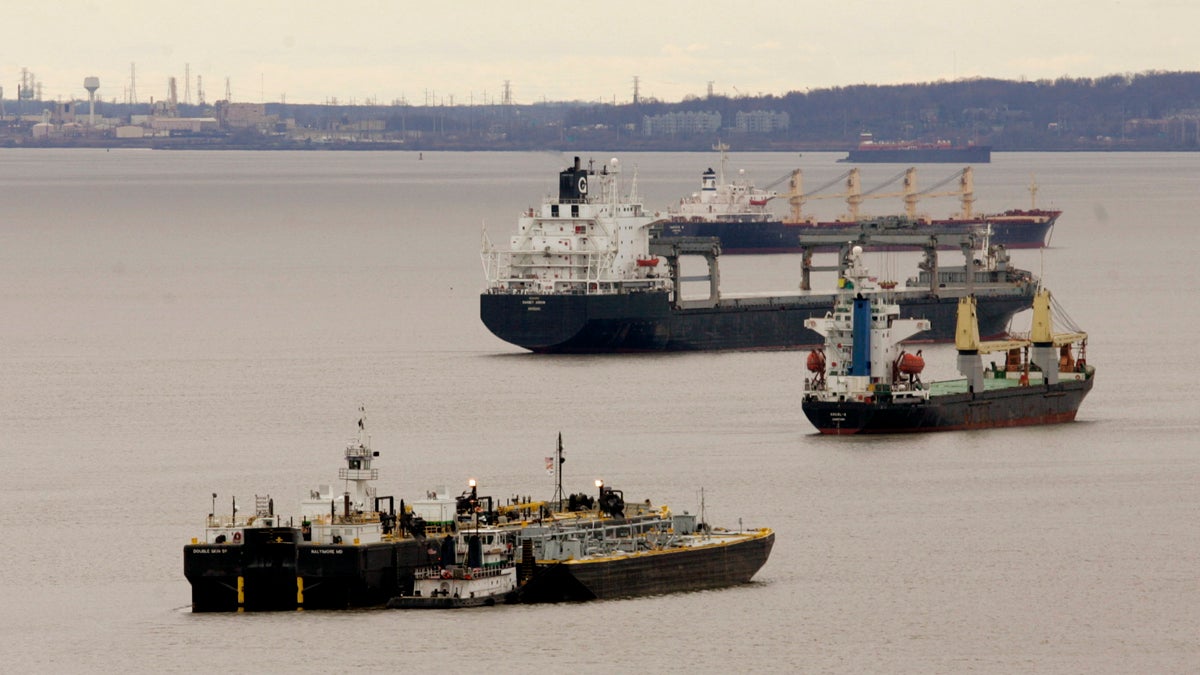Coast Guard wants fracking wastewater tested before allowing its transport on barges

Ships and barges are idle in the middle of the Delaware River between Chester, Pa., and Wilmington, Del. (Chris Gardner/AP Photo)
Natural gas drillers want the U.S. Coast Guard to allow them to transport millions and millions of gallons of fracking wastewater on the nation’s waterways. Federal law doesn’t consider that wastewater to be hazardous, but the Coast Guard does.
In Pennsylvania, many operators recycle wastewater and store it on site, while much of it is shipped on trucks and rail cars to Ohio where it’s disposed of in deep injection wells. Moving wastewater on barges would be a more efficient alternative.
The Coast Guard wants to require shippers to test the fluid they’re carrying to make sure it doesn’t contain hazardous materials it doesn’t normally allow to travel on the nation’s waterways.
“In this case, the cargo is not a well-characterized product as most cargoes are, so we will be requiring ongoing monitoring of the shipments,” Dr. Cynthia Znati of the Coast Guard’s Hazardous Materials Division said in an email.
The chemical composition of wastewater, also known as “flowback,” can vary depending on the recipe a driller uses to frack a well and even where that well is drilled. It contains a high level of salts, as well as naturally occurring heavy metals and some radioactive material.
Barge owners would be required to have each load of wastewater analyzed at a state-accredited lab and make the reports available to the Coast Guard for two years.
But that requirement could get complicated for barge owners including Peter Stephaich, CEO of Campbell Transportation in Pittsburgh. One barge could hold about 100 truckloads of wastewater from different drilling sites.
“One [bad] apple would spoil the bunch,” Stephaich said. “And it’s not our water. We would be stuck with the water and it would be very difficult for us to go back and find out whose water that was and undo that process.”
James Guttman, vice president of the Guttman Oil Company, thinks it should be tested by operators at the drilling site.
“But to test every truck and barge that comes through is a logistical delay that would be expensive,” Guttman said.
Oil and gas industry trade groups are calling for an extension of the public comment period ending Friday at midnight. David Spigelmyer, the new president of the Marcellus Shale Coalition, said the industry needs more time to study the implications of the Coast Guard’s proposal.
When asked if he supported the resting requirement, Spigelmyer said the “industry does do thorough investigative analysis on a lot of the transportation loads that come onto area roadways.”
Fracking wastewater is exempt from the Resource Conservation and Recovery Act (RCRA), which establishes federal standards for the disposal of hazardous waste. As long as the wastewater is on the drill site, or in transit, it is not considered hazardous.
WHYY is your source for fact-based, in-depth journalism and information. As a nonprofit organization, we rely on financial support from readers like you. Please give today.

